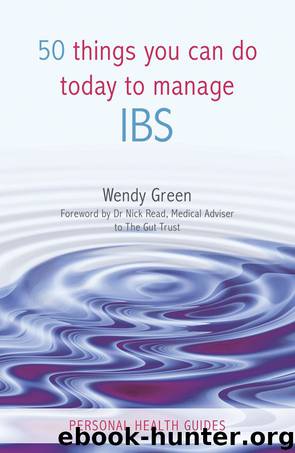IBS by Wendy Green

Author:Wendy Green
Language: eng
Format: epub
Publisher: Summerdale
Published: 2011-07-28T00:00:00+00:00
What is stress?
Stress is basically the way the mind and body respond to situations and pressures that leave us feeling inadequate, or unable to cope. One person may cope well in a situation that another might find stressful: it’s all down to the individual’s perception of it and their ability to deal with it.
The brain reacts to stress by preparing the body to either stay put and face the perceived threat or to escape from it. It does this by releasing hormones – chemical messengers – including adrenaline, noradrenaline and cortisol, into the bloodstream. These speed up the heart rate and breathing patterns and may induce sweating. Glucose and fatty acid levels in the blood rise, to provide a burst of energy to deal with the threat. This is called the ‘fight or flight’ response.
Nowadays, the situations that induce the stress response are unlikely to necessitate either of these reactions. Those that continue for a long period of time with no end in sight, for example longterm unemployment, illness or an unhappy relationship, mean that stress hormone levels remain high, thereby increasing the risk of major health conditions such as coronary heart disease, as well as other psychological and physical symptoms. These include irritability, poor concentration, anxiety, depression, headaches, skin problems
and digestive problems such as IBS, so it’s important to find ways to reduce and deal with stress. There are various theories that link stress to IBS symptoms.
The brain-gut axis
In recent years, researchers have learned that the gut contains more nerve cells than the spinal cord, and that the brain and gut constantly exchange messages. This means that whatever affects the brain is likely to affect the gut, and vice versa. This explains why a shock such as bereavement, or worry, can cause some people to lose their appetite. Scientists devised the term ‘brain-gut axis’ to describe this close relationship between the brain and the gut. This suggests that when people with IBS take steps to reduce stress, anxiety and depression by calming their mind, they can literally calm their gut as well.
Stress hormones and gut pain
When you are stressed, as well as releasing adrenaline, your body releases a hormone called CRF (corticotropin releasing factor), which stimulates the release of cortisol. It’s thought that during prolonged stress, adrenaline and CRF affect the nerve cells in the gut, making them more sensitive to pain, so that even normal contractions are extremely painful. This could explain the abdominal pain many IBS sufferers experience when they are stressed.
Stress and ‘leaky gut syndrome’
Other researchers believe that prolonged exposure to stress hormones irritates the gut lining, making it hypersensitive and prone to ‘leaky gut syndrome’. This is where the gut wall becomes weakened and allows partially digested food to leak through into the bloodstream, where it causes an immune response (see Chapter 2).
Serotonin and IBS
Another theory is that when you are feeling stressed, or depressed, there are chemical changes in your brain that affect the speed of gut contractions. Serotonin is a key brain chemical
Download
This site does not store any files on its server. We only index and link to content provided by other sites. Please contact the content providers to delete copyright contents if any and email us, we'll remove relevant links or contents immediately.
Periodization Training for Sports by Tudor Bompa(8273)
Why We Sleep: Unlocking the Power of Sleep and Dreams by Matthew Walker(6725)
Paper Towns by Green John(5191)
The Immortal Life of Henrietta Lacks by Rebecca Skloot(4588)
The Sports Rules Book by Human Kinetics(4387)
Dynamic Alignment Through Imagery by Eric Franklin(4217)
ACSM's Complete Guide to Fitness & Health by ACSM(4060)
Kaplan MCAT Organic Chemistry Review: Created for MCAT 2015 (Kaplan Test Prep) by Kaplan(4012)
Livewired by David Eagleman(3775)
Introduction to Kinesiology by Shirl J. Hoffman(3772)
The Death of the Heart by Elizabeth Bowen(3622)
The River of Consciousness by Oliver Sacks(3604)
Alchemy and Alchemists by C. J. S. Thompson(3522)
Bad Pharma by Ben Goldacre(3428)
Descartes' Error by Antonio Damasio(3279)
The Emperor of All Maladies: A Biography of Cancer by Siddhartha Mukherjee(3163)
The Gene: An Intimate History by Siddhartha Mukherjee(3098)
The Fate of Rome: Climate, Disease, and the End of an Empire (The Princeton History of the Ancient World) by Kyle Harper(3067)
Kaplan MCAT Behavioral Sciences Review: Created for MCAT 2015 (Kaplan Test Prep) by Kaplan(2986)
